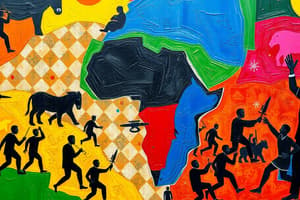Podcast
Questions and Answers
What is the Scramble for Africa?
What is the Scramble for Africa?
The Scramble for Africa was the occupation, division, and colonization of African territory by European powers during the period of New Imperialism, between 1881 and 1914.
Which countries participated in the Scramble for Africa? (Select all that apply)
Which countries participated in the Scramble for Africa? (Select all that apply)
- France (correct)
- Germany (correct)
- Britain (correct)
- China
Most powerful colonial country in Africa by 1870?
Most powerful colonial country in Africa by 1870?
The Ottoman Empire
Which parts of the African continent were first colonized and why?
Which parts of the African continent were first colonized and why?
What was the most powerful colonial country in Africa by 1914?
What was the most powerful colonial country in Africa by 1914?
Countries wanted to colonize Africa for its sources of ______.
Countries wanted to colonize Africa for its sources of ______.
What made colonization difficult?
What made colonization difficult?
What technologies overcame the challenges of colonization?
What technologies overcame the challenges of colonization?
What does 'ruling through natives' mean?
What does 'ruling through natives' mean?
What was Dr. David Livingstone known for?
What was Dr. David Livingstone known for?
Who was Henry Stanley?
Who was Henry Stanley?
Name three major rivers in Africa.
Name three major rivers in Africa.
What resources were primarily extracted from the Belgian Congo?
What resources were primarily extracted from the Belgian Congo?
Flashcards are hidden until you start studying
Study Notes
Scramble for Africa
- The Scramble for Africa involved European powers occupying, dividing, and colonizing African territories from 1881 to 1914.
- Only 10% of Africa was under European rule in 1870, which surged to nearly 90% by 1914.
Participating Nations
- Major players included Britain and France, with Britain claiming much of eastern Africa and France occupying most of northwestern Africa.
- Other colonial nations included Germany, Belgium, Portugal, Italy, and Spain, who acquired smaller territories.
Colonial Powers
- The Ottoman Empire was the most powerful colonial entity in Africa by 1870, controlling regions in North Africa and the Balkans.
- By 1914, Great Britain emerged as the dominant colonial power, supported by its formidable navy.
Initial Colonization Areas
- Coastal regions were the first to be colonized due to easier accessibility.
- Settlements formed where explorers first arrived and established trade with northern African nations.
Motivations for Colonization
- Industrialization drove European countries to seek raw materials, such as copper, cotton, and rubber, along with precious resources like oil, gold, and diamonds.
- Nationalism fueled competition among European nations to claim vast territories.
- Religious motives included converting Africans to Christianity.
Challenges of Colonization
- Diseases endemic to Africa caused high mortality rates among colonizers and their horses.
- European firearms were often of poor quality, leading to reliance on traditional weapons, where locals had the advantage.
- Local resistance was robust and fierce against colonial intruders.
Technological Advances
- Steamships allowed easier inland travel, effectively replacing horses.
- Quinine became essential in combating malaria.
- Advances in gun technology, particularly machine guns, significantly aided colonial efforts.
Indirect Rule
- "Ruling through natives" or indirect rule involved maintaining local leaders while controlling them, a strategy preferred to direct appointments from European powers.
Exploration and Adventure
- Exploring Africa was seen as an adventure, fueling further motivations for colonization.
- The search for the Nile's source and other landmarks intensified competition among European nations.
Notable Figures
- Dr. David Livingstone: A Scottish medical missionary and explorer who advocated for African humanitarian issues and against slavery, respected local populations, and worked to combat diseases.
- Henry Stanley: A British journalist who famously located Livingstone in 1871; he conducted multiple expeditions in Africa, establishing trade posts and promoting Belgian King Leopold II’s interests in the Congo.
Major Rivers
- Key rivers in Africa include the Congo, Niger, and Nile.
Belgian Congo
- The Belgian Congo was primarily known for ivory and rubber, with additional resources like diamonds and gold.
- Established by Henry Stanley, it became a significant territory for exploitation under King Leopold II.
Studying That Suits You
Use AI to generate personalized quizzes and flashcards to suit your learning preferences.




